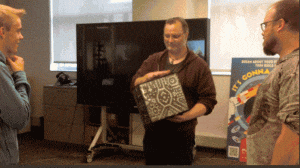The best intro to Augmented Reality may be the MergeCube: https://mergevr.com/cube
In 45 min, Mark Gill with the SCSU Vizlab (https://www.facebook.com/SCSUVizLab/), Alan Srock (Astronomy), and Plamen Miltenoff with InforMedia Services (https://www.facebook.com/InforMediaServices/) will guide you through ideas and hands-on setup of the MergeCube in your lesson plans.
When: October 22, 11AM
Where: Miller Center 205 (“how to get” directions here: https://youtu.be/jjpLR3FnBLI )
or join us via Zoom: https://minnstate.zoom.us/my/mergecube
Who: faculty, staff, students interested in exciting new educational technology

Here is more information about the ed use of MergeCube:
https://youtu.be/Agb3N6B8jHM
https://youtu.be/LRbn79WQEVU
https://youtu.be/OeTUIVhhAXY
A Toolkit for an Immersive VR/AR Experience: The Verb Collective
https://events.educause.edu/annual-conference/2019/agenda/a-toolkit-for-an-immersive-vrar-experience–the-verb-collective
The Verb Collective is an open set of VR/AR assets built on Unity and designed to help nonprogrammers (arts and humanities students) that quickly transform ideas into 3D experiences. Learn how the Verb Collective is used in the classroom and explore templates to create your own action assets.
Outcomes: Help new VR/AR users quickly create their own 3D experiences using the Verb Collective framework * Access and install the framework * Add to the framework by using a simple verb-based template to outline new actions
Getting Started with Augmented Reality in the Classroom
+++++++++++
more on AR and learning in this IMS blog
https://blog.stcloudstate.edu/ims?s=augmented+reality+learning
We define immersive scholarship as any scholarly work developed through or implemented utilizing technologies including Virtual Reality, Augmented Reality, Mixed Reality, Visualization (i.e., large format displays and visualization walls, GIS, Tableau), and any related hardware, programs or software.
We are seeking survey participants who are employed in an academic library and who currently support immersive scholarship and technologies at their institution.
how your academic library has developed tools, implemented third party hardware/software, and in what barriers you have identified at your institution in supporting immersive scholarship.
Link to Online Survey
K–12 Teachers Use Augmented and Virtual Reality Platforms to Teach Biology
Immersive technology allows students to explore the world firsthand on a molecular level.
Eli Zimmerman
https://edtechmagazine.com/k12/article/2019/03/k-12-teachers-use-augmented-and-virtual-reality-platforms-teach-biology-perfcon
t universities and medical schools, students are already using AR and VR
Originally, AR and VR lesson plans revolved around the virtual field trip.with the HTC Vive, for example, can take a detailed, 3D-rendered journey.
In May 2018, Google announced a partnership with Labster, a virtual lab simulator, to develop immersive high school and college biology and anatomy courses.
by Intel last year, Middle Township High School in New Jersey embraced the idea of using Oculus Rift headsets to examine virtual frogs. In California, a new bill introduced in the state legislature would swap out real animals in schools for virtual replacements to teach biology more humanely.
